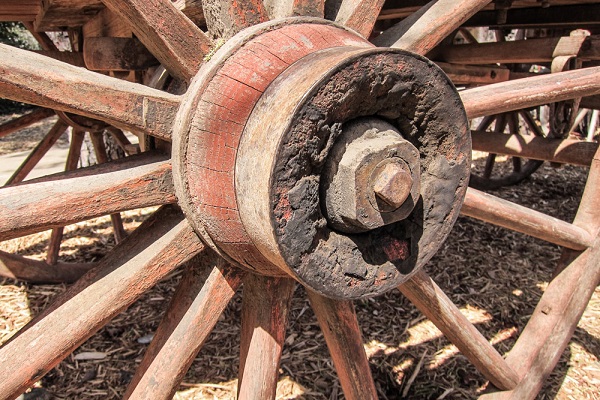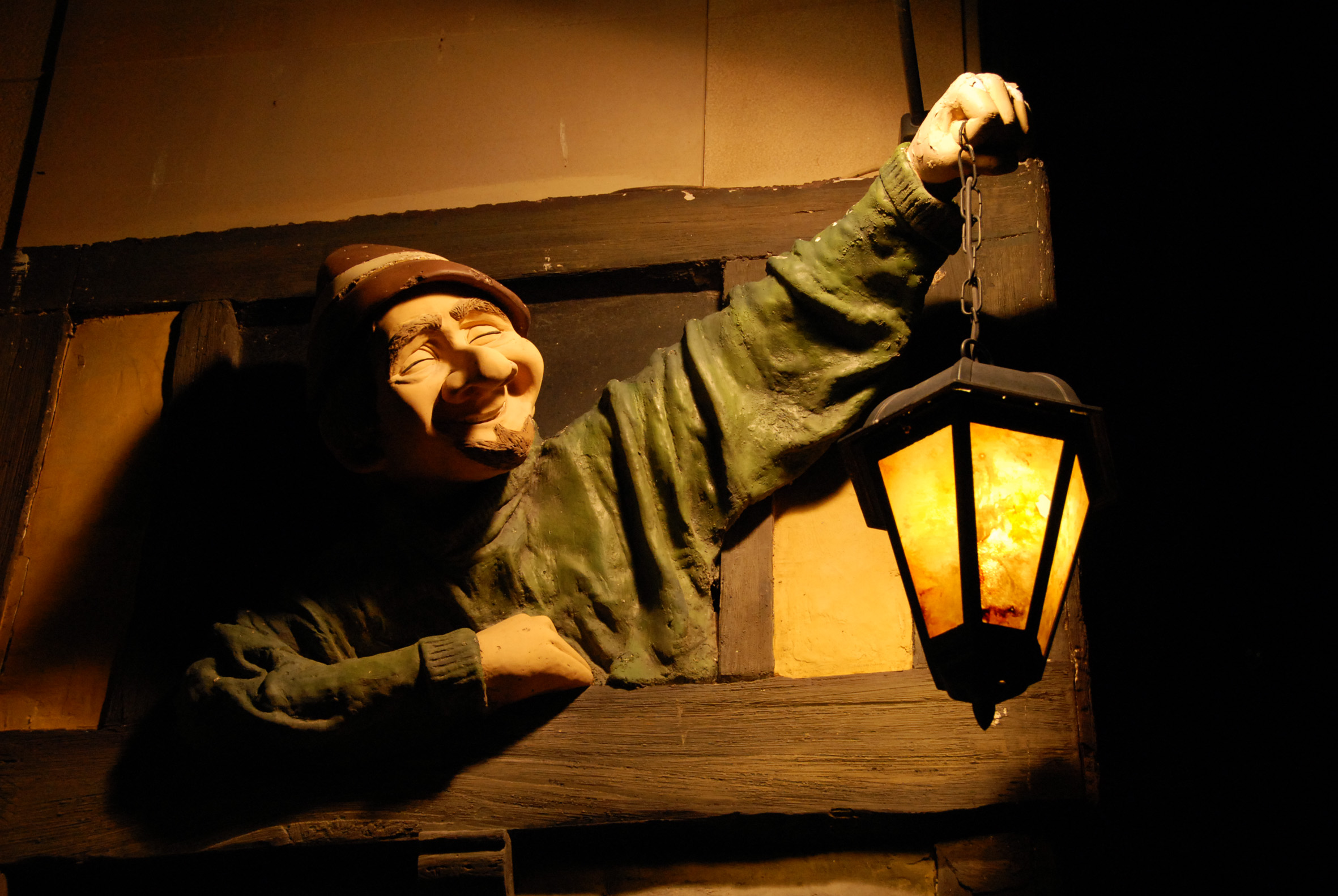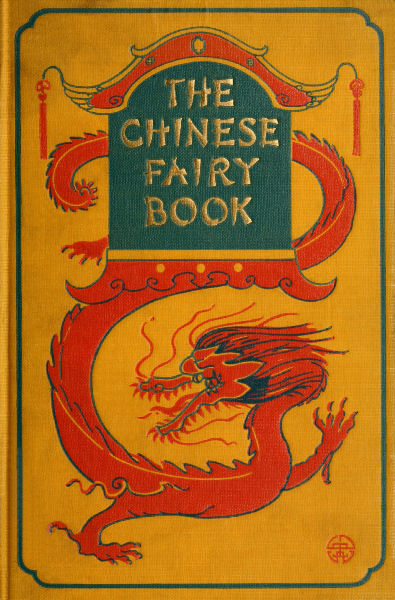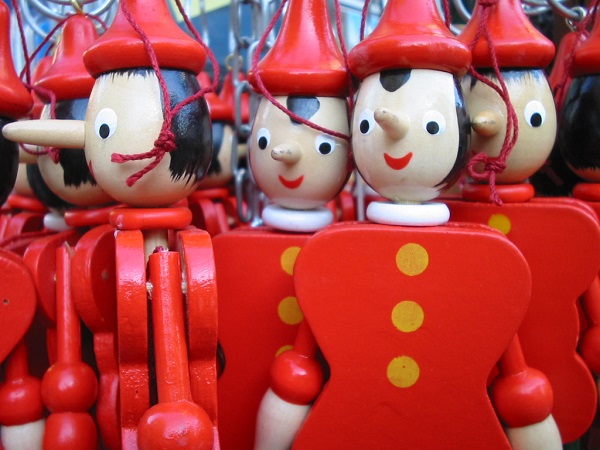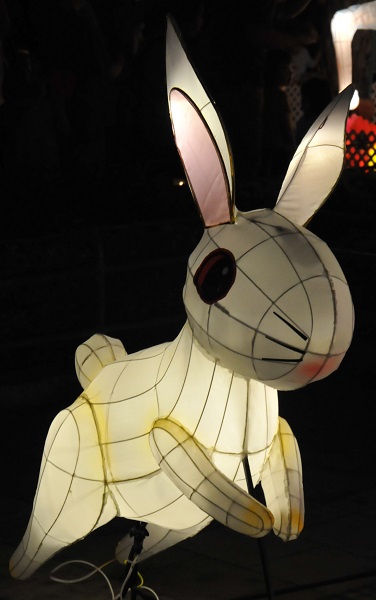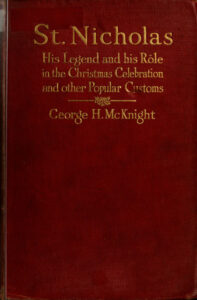St. Nicholas – His Legend and His Role in the Christmas Celebration and Other Popular Customs (By George H. McKnight, 1917) – Chapter 7

CHAPTER VII
ST. NICHOLAS PLAYS
In our time the celebration of St. Nicholas’ day has lost much of the ceremony that was once associated with it. Even in countries like Belgium and Holland, where the day is a great folk festival, there is little to connect the day with the story of the beloved bishop-saint. “Sinterklaes” is better known than St. Nicholas. In early days the case was different. Particularly in the centuries immediately following the transfer of the St. Nicholas relics to Italy, the time when the vogue of the eastern saint reached its height in the countries of western Europe, in many ways his story was kept fresh in the popular memory. Not only did the Boy Bishop custom commemorate, in somewhat extravagant fashion to be sure, the elevation of the boy Nicholas to the rank of bishop, but stories of the life of the saint formed an important part of the lectiones, or “readings,” for the day in the church; and more important still, some of the principal episodes in his life formed the subject, in church schools, for hymns which later developed into little plays. In the election of the Boy Bishop was reenacted with a great deal of adventitious detail one of these episodes. In more strictly dramatic fashion were reenacted the four episodes: (1) of the maidens saved from a life of shame; (2) the three murdered schoolboys restored to life; (3) the kidnapped boy restored to his parents; and (4) the Jew that put his treasures in charge of the image of St. Nicholas.
These little St. Nicholas plays have genuine significance in the early history of the modern drama. At a time when the classical drama was dead, when the works of Plautus and Terence were valued as repositories of sententious expressions and their dramatic character apparently not suspected, when the names tragedy and comedy were almost entirely dissociated from dramatic meaning, by one of the strange ironies of life, under the auspices of the Church, which had been hostile in its attitude toward earlier drama, there was created, seemingly without being realized, the germ from which developed the modern drama. The St. Nicholas plays go back to an early stage in the new dramatic development. Little dramatic scenes from scriptural story began to find a place in the liturgy of the Church as early as the tenth century. St. Nicholas plays are not much later, and are the earliest ones handling scenes drawn from outside the biblical story. They begin not later than the first of the twelfth century. St. Nicholas may almost be regarded as the patron saint of the modern drama, since he seems to have watched over its birth.
The St. Nicholas plays were represented apparently by the choir boys in connection with the celebration of the festival of their patron saint. The language used was Latin, of a schoolboy variety, but vernacular elements soon began to appear. Forming, as they did, a part of the school service, and presented, as they were, by choir boys, as might be expected, they were for the most part sung or chanted. Their purpose to provide entertainment and their dissociation from the older drama are indicated by the names applied to these primitive dramas. Miracula was the name given them when the subject-matter was in mind; when their character and purpose were in mind the name applied to them in Latin was ludus, in French, jeu. The actors at a comparatively early time in English were called players before the word ‘play’ had yet acquired its later definitely dramatic meaning.
The subjects from the St. Nicholas story used in these little plays have been mentioned. One should notice what a range of interest is comprised in these four stories. They afford opportunity for the use of many of the cant phrases of the modern dramatic critic. There was a melodrama of crime, a primitive detective play, with St. Nicholas playing the part of detective in discovering the crime of the innkeeper and his wife. There was a play dealing with the rough road to matrimony, ending in a triple marriage, hardly surpassed in modern love comedy. There was a sentimental comedy, with gripping heart interest, in the story of the boy abducted and restored. There was a screaming farce in the story of the Jew that was robbed. It should be noted, too, that the modern “tired business man” would find the endings in all four as happy as could be wished.
One of the early St. Nicholas plays also is of interest because it is one of three plays composed by the earliest determinable personality in connection with the authorship of modern drama. The name of the author, Hilarius, seems to have been no misnomer. He was probably an Englishman, or an Anglo-Norman, who went to France to study under Abélard. He is the author of a number of innocent love poems, playful in tone addressed to an English Rose and to his nun friends, Bona and Superba. From his writings we learn that he was not only lively, but fat. Along with a number of other students, on account of some misbehavior, he seems to have suffered a kind of rustication and been obliged to leave the monastery where he was studying and to take up residence in a neighboring village. In a mock elegy he feigns despair at being deprived of the privilege of hearing lectures. Altogether the character of this medieval student is easy to associate with the farcical little Latin play which he wrote, back in the twelfth century, presenting the story of the Jew who committed his valuables to the care of the image of St. Nicholas.
This play, or operetta, for it was intended for song and chant by the choir boys, is composed in rimed Latin stanzas, practically impossible to reproduce in form and in spirit with any degree of literalness in English, although Professor Gayley has accomplished the miraculous with one or two of them.
The dramatis personæ in the play are: Barbarus (a Heathen), owner of the treasure, corresponding to the Jew in the Golden Legend version of the story, four or six robbers, and St. Nicholas. At first the Heathen, having assembled his treasures, approaches an image of St. Nicholas (represented by a man standing in a shrine) and puts them in care of the image, saying (probably in song):
The thought of which may be rendered freely:
Nicholas, all that I possess, I have put in this chest. I leave it to you in charge; keep what is here. I pray you, listen to my request. See to it that no thief gets in. I am putting in your charge gold and precious raiment.
In a second like stanza Barbarus expresses the security that he feels now that his valuables are in the charge of the image of St. Nicholas and at the same time warns the image that there will be trouble if anything happens to his property.
When Barbarus has gone, tramps, noticing the house open and without guardian, carry off everything. When Barbarus returns, he finds his treasure gone and expresses his feelings in song. His song consists of three Latin stanzas, each with a French refrain probably joined in by the other members of the boy choir. It begins:
The rime scheme of which may be reproduced something like this:
Two stanzas with the same refrain follow. Then Barbarus turns to the image and lays on it the blame in two additional stanzas with the threatening French refrain:
(If you don’t give me back my things, I’ll make you pay for it.)
Barbarus then takes up a whip and vents his feelings in two additional stanzas of the same sort, the form and spirit of which Professor Gayley has admirably caught in English
The amount of whipping and other stage “business” to accompany this recitative might safely be trusted to choir boy impromptu. The Latin text of the play at this point gives the following simple directions: “Then St. Nicholas shall go to the thieves and say to them:”
In four Latin stanzas he tells the thieves that he has been whipped because he cannot restore the things left in his charge, and threatens:
(If you don’t do this, you will be hanged to-morrow on a gibbet, for your misdeeds and thievery, I will proclaim abroad.)
The threats have the desired effect on the thieves, who in fear return the goods, with no accompanying words provided by the playwright.
When Barbarus finds his treasures again, in a series of three macaronic stanzas, Latin and French, he expresses his joy and surprise, ending with praise for the guardian:
(What a good watch I have had! it returns everything. I am quite surprised.)
The alternating lines in French form a refrain in which, as in the other songs, the other choir boys have a chance to join.
Then Barbarus approaches the image and in three like stanzas, Latin and French, expresses his gratitude.
At this point St. Nicholas in person makes his appearance. He disclaims any credit to himself, and bids Barbarus praise God alone, through Whom his things have been restored.
Barbarus in reply renounces heathen faith and praises God, the maker of heaven and earth and sea, Who has forgiven his sin.
The printed text of the little play is simple enough, but the easy swing of the series of Latin songs and the French refrains offering opportunity for choral participation, the beating of the image, and the impromptu comedy “business” which choir boys might be counted on to supply, would provide as much entertainment at a church festival to-day as they doubtless did in the St. Nicholas’ eve celebration of the twelfth century.
In a single manuscript there are preserved four St. Nicholas plays of a century later. The stories presented in these plays are the four mentioned above. The play of the abducted son of Getro may here represent the series.
This Latin play, almost entirely in rimed couplets, is more serious in tone and in general a more elaborate production than the little play by Hilarius. It was staged in characteristic medieval fashion, with simultaneous set; that is to say, there were a number of prepared stations, side by side, all visible, and the action shifted from one station to another. A rubric in the manuscript indicates the stage arrangement.
In order to represent how St. Nicholas freed the son of Getro from the hands of Marmorinus, King of the Agarenes, King Marmorinus shall appear, surrounded by armed servitors and seated on a high seat as if in his own kingdom. In another place, shall be represented Excoranda, the city of Getro, and in it Getro, with his consolers, his wife Euphrosina and their son Adeodatus. East of the city of Excoranda shall be the church of St. Nicholas in which the boy is taken captive.
The action shifts from one of these stations to the other, all the stations and all the characters, however, being constantly visible.
In the opening scene the servitors approach King Marmorinus, and, “either all together, or the first one speaking for all,” say:
Hail prince, hail greatest king. Do not delay to declare thy will to thy servants; we are ready to do what thou dost wish.
These words apparently are sung, since they are in rimed verse and since song alone would be appropriate for speech in unison. The king replies:
Go then, do not delay, and subject to my rule whatever people you can; kill any that resist.
With this the action shifts to another station.
“In the meantime Getro and Euphrosina with a band of schoolboys,” the stage directions tell us, “shall go to the church of St. Nicholas, to celebrate his festival, and shall bring with them their son; and when they shall see the armed servitors of the king coming there, they shall flee to their own city, in their fright forgetting the boy. But the servitors of the king shall seize the boy and bring him into the presence of the king, and either the second of them or all in unison shall say,” apparently in song:
We have done, O king, what thou didst order; we have subjected many people to thee and of the things acquired, we are bringing to thee this boy.
Then the third one, or all in unison, shall say:
The boy is fair of face, of active mind, and noble race; it is fitting, in our opinion, that he enter thy service.
The king:
Praise be to Apollo who rules all, and thanks to you who have made so many countries subject and tributary.
And then, addressing the boy:
Good boy, tell us, what is thy land, what thy race; what is the faith of the people of thy country; are they gentile or Christian?
The boy:
My father, Getro by name, is prince of the people of Excoranda; he worships God, who rules the seas, who made us and thee and all things.
The king:
My god, Apollo, is the god that made me. He is true and good. He rules the land, he reigns in the air; him alone we ought to believe in.
The boy:
Thy god is false and evil; he is stupid, blind, deaf, and mute. Thou shouldst not worship such a god, who cannot rule even himself.
The king:
Say not such things; do not offend my god; for if thou dost make him angry, thou canst not in any way escape.
In the meantime, the directions tell us, Euphrosina shall discover that her son has been forgotten and shall return to the church. And when she shall not find the boy, she shall sing the following Miserere:
The consolers shall come to her and say:
In what way does this grieving aid? Cease to weep, and pray for thy son to the highest Father, and he will give him aid.
Euphrosina, not heeding the words of consolation, shall continue:
Dear son, most beloved child; child, the great part of my soul; now thou art to us the cause of sadness who wert the cause of joy.
Comforters:
Do not despair of the grace of God. He whose great mercy gave thee this boy, will return to thee either him or another.
Euphrosina:
My soul is disturbed within me. Why should death delay? When I am not able to see thee, my son, I prefer to die rather than to live.
Comforters:
Struggle, grief, and despair injure thee and do not profit thy son; instead, from thy wealth give to schoolboys and to the poor. Ask the kindness of Nicholas that he may pray for the mercy of the Father on high for thy son, that thy prayer may not fail.
Euphrosina (praying to St. Nicholas):
Nicholas, most holy father, Nicholas most dear to God, if thou wishest that I should worship thee longer, cause my son to return. Thou that didst save many in the sea, and three men from the bonds of death, listen to the prayer of me, a suppliant, and assure me that it will be granted. I will not eat of flesh longer, nor partake of wine, nor enjoy anything more until my son shall return.
Getro:
Dear sister, cease to mourn: thy tears avail thee nothing. But seek the propitiation of the Father on high for our son. To-morrow is the festival of St. Nicholas whom all Christianity ought to worship, to venerate, to bless. Hear, then, my counsel. Let us go to his festival. Let us praise his greatness and seek his support. Perhaps it is an inspiration of God that admonishes me on account of our son. With the grace of God we must pray for the great kindness of Nicholas.
Then they shall get up and go to the church of St. Nicholas. And when they have entered, Euphrosina shall stretch her hands out toward heaven and say:
Highest Father, king of all kings, sole king, and sole hope of mortals, make to be returned to us our son, the solace of our life. Hear the prayers of us suppliant. Thou that didst send thy Son into the world to make us citizens of Heaven, to save us from the bars of hell. Father God, thou whose power dost supply everything good, do not cast off me a sinner, but let me see again my son. Nicholas, whom we call a saint, if all is true that we believe concerning thee, let thy prayers go forth to God for us and our son.
“After these words,” the directions tell us, “she shall leave the church and go home and there prepare a table with bread and wine for the entertainment of schoolboys and the poor. When these have been invited and have begun to eat, Marmorinus (at the other end of the stage) shall say to his servitors”:
My beloved, I want to tell you that I have never in my life felt such hunger as I have to-day. I can’t stand it. Make ready what I ought to eat and save my life. Why delay? Go quickly, prepare at once something for me to eat.
The servitors then shall go and bear food to the king and shall say:
We have prepared the food as thou didst command and here it is. Now if thou dost wish, thou mayst grow fat in extinguishing thy hunger.
Then water is brought, and the king washes his hands and begins to eat and says:
I was hungry, now I am thirsty. Bring me wine, and no delay about it, my servant, son of Getro.
The boy, hearing this, shall sigh deeply, saying to himself:
Alas! Alas, poor me! I should like to die, for as long as I live, I shall never be free.
The king, addressing the boy:
Why dost thou sigh so? What ails thee? What dost thou want?
The boy:
I was thinking of my misery, of my father and my native land. I began to sigh, and said to myself, “It is a year to-day since I entered this country, and was made a miserable slave, subject to royal power.”
The king:
Poor wretch, why dost thou think about it? What good does thy grieving do? None can take thee from me as long as I do not care to lose thee.
“In the meantime,” the directions tell us, “some one in the likeness of Nicholas shall take up the boy holding in his hand the cup with fresh wine, and shall place him before his father’s city and, as not seen, shall depart. Then one of the citizens shall say to the boy”:
Boy, who art thou, and where goest thou? Who gave thee the cup with the fresh wine?
The boy:
I am here and am not going farther. I am the only son of Getro. Glory and praise to Nicholas whose grace brought me back here.
Then that citizen shall run to Getro and say:
Be glad, Getro. Weep no more. Outside stands thy son. Praise be to Nicholas whose grace restored him.
“When Euphrosina hears this message, she shall run, and after kissing and embracing her son many times, shall say”:
To our God be glory and praise. Whose great mercy, turning our grief to joy, has released our son. To our father Nicholas be enduring praise and thanks, whose prayer to God aided us in this affair.
The play ends with the choral singing of the Latin hymn to St. Nicholas, beginning with the words “Copiosæ Caritatis.”
As already remarked, these Latin plays of St. Nicholas are the earliest plays handling subjects outside the scriptural narrative, also one of the St. Nicholas stories is the subject of one of the group of plays by the earliest medieval dramatist known by name. In another way the name of St. Nicholas is associated with the beginnings of the modern drama, in that one of the St. Nicholas stories provides the theme for one of the earliest of plays in a vernacular tongue and produced under secular control. The play in question is the famous one by Jean Bodel produced at Arras in the very first years of the thirteenth century. The time of production was probably the eve of St. Nicholas’ day, and the producing actors were the members of a secular fraternity of which St. Nicholas was the patron saint, possibly, Gaston Paris suggests, the famous minstrel brotherhood at Arras that had for its palladium the famous candle, said to have set itself on the viol of one of the brotherhood while he played before the altar.
The story told in this play is one already well known as a subject for dramatic rendering in Latin, one of three handled by Hilarius, the story of the image of St. Nicholas and the robbers. But in this vernacular play St. Nicholas himself is overshadowed by the new elements that hav been joined to the story. The Jew, or pagan, of earlier versions of the story, here appears as a Saracen king at war with the Christians. The thieves are tavern revelers who steal in order to pay their tavern score.
In condensed summary, following largely the summary by Creizenach the story runs as follows:
After a prolog in which the content of the story is related, the messenger Auberon appears and announces to the king that the Christians have invaded his land. The king is enraged at his idol Tervagant that this has been possible in spite of the fact that the image has recently been richly gilded. Auberon is sent forth to summon the emirs with their armies. There follows a scene between the Christians and Saracens, which is imbued with all the ardor and spirit of the crusading times. The Christians show divinely inspired bravery and are visited by an angel which encourages them in the fight. They are defeated in battle, but the angel announces that they have won a place in Paradise. The Saracens find on the battlefield only one Christian alive, and he is kneeling before an image of St. Nicholas. The man with his image is brought before the Saracen king, who in ridicule asks what the ugly old chap is good for. The Christian announces that the image is excellent as a protector of treasure. The king determines to test the image and causes his herald Connart to proclaim that the treasure will be left open, guarded only by the image of St. Nicholas. The Christian prisoner is given over to the hangman Durand to die if his patron saint does not live up to his reputation.
The scene shifts to a tavern. The innkeeper has his man servant announce that he has a fine wine for the epicure, a wine which he describes in most eloquent fashion. The rogues assemble, and in a drawn-out scene manifest their appreciation of the good wine, but at the end are unable to pay their score. They determine to steal the unguarded royal treasure, and the innkeeper agrees to receive the stolen goods. They enter the treasure chamber, and with great labor, which affords much comedy, get away with the heavy chest.
The theft is discovered, and the Christian prisoner is ordered to be hanged, but gets a suspended sentence of one day, and cheered by an angel, awaits the intervention of the saint.
The thieves, in the meantime, have brought the treasure to the tavern and continue their revelry until they fall asleep. Hardly has sleep overtaken them, when the saint appears and in gruff language demands the return of the treasure, with the gallows as the alternative. The thieves, panic-stricken, carry the treasure back. One of them proposes that each take a handful of gold pieces, but they are too much terrified, and in the end the ringleader must leave his mantle with the innkeeper in settlement.
The king, delighted at the protection afforded, takes the Christian into high favor, naturally to the disappointment of the hangman. He also decides to abjure his old faith, and his emirs feel it their feudal duty to follow his example, with the exception of one, who, however, is compelled to kneel before the saint’s image. In the midst of all this the image of Tervagant utters a frightful shriek, but is, by command of the king, cast out of the “Synagogue” in shame and disgrace while the Christian starts a Te Deum, in which the actors, and, perhaps, the spectators, join.
In this play it will be observed that the old story is made to serve a new purpose. St. Nicholas is made an exponent of the virtue of Christianity as opposed to the Saracen faith. The story is developed with much supporting detail. The struggle between Christian and Saracen is represented with true crusading zeal, in the spirit which pervaded the contemporary romances of Charlemagne and his paladins. On the other hand, balancing with these scenes, noble in tone, were the low comedy scenes provided by the tavern revelers, drinking, casting dice, quarreling, and speaking a slang often unintelligible to the modern reader, in general affording remarkable genre pictures of French life in the early thirteenth century.
In his two-sided development of the dramatic values in this story, the author established a method which one might have expected to be followed by his contemporaries, a method actually followed, a little later, in the development of the native English drama. In reality, however, the play occupies a solitary position in its own day and age. To the author must be given the credit of original creation, of being ahead of his time. But this credit the author must share with the story of his play, for has not the name of St. Nicholas through all the centuries, down to our own time, been constantly associated, not only with the idea of noble beneficence, but with a peculiar quality of good nature and fun?
